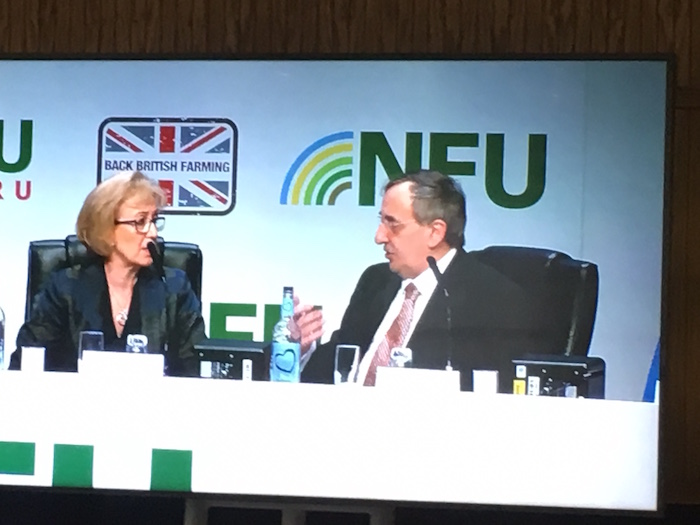NFU president Meurig Raymond sought clarity from Defra Secretary Andrea Leadsom on what Brexit will mean for UK farmers on the opening day of the NFU’s conference.
She responded by outlining five key principles underpinning Defra’s approach to the negotiations but offered little in terms of fresh insight to the 1,000 farmers inside Birmingham’s ICC.
In his opening speech, Mr Raymond said farming would be ‘one of the most impacted sectors post-Brexit’ and highlighted three areas Government needs to take action on if Brexit is to be successful for the country’s food and farming industry.
- Unrestricted access to the European market
- Continued access to a competent and reliable workforce both pre and post farm-gate
- A new agricultural policy which assists in the development of an increasingly productive, progressive and above all profitable farming sector.
He highlighted industry concerns about the prospects of the Government failing to secure a free trade deal with the EU, resulting in UK farmers facing large tariffs on exports.
He said: “The Prime Minister said at Lancaster House that NO deal is better than a bad deal. I say to you Secretary of State that NO deal on trade for agriculture IS a bad deal.”
He also voiced fears about the transition to new global markets, such as Brazil, Russia, India and China.
“We commend the ambition to open up trade with new partners. But how in reality, Secretary of State, will you keep out food produced to a lower standard than our own out? Would the British public want us to start importing beef produced using growth promoting hormones? Or chickens dipped in chlorine?”
On labour, he urged Mts Leadsom to work with the industry ‘as a matter or urgency’ to secure access to labour, permanent and seasonal, for farmers and processors.
“Without a workforce – permanent and seasonal, it wouldn’t matter what a new trade deal looks like, the lights would go out in our biggest manufacturing sector, food will rot in the fields… and Britain will lose the ability to produce and process its own food,” he said.
Leadsom response
Following Mr Raymond onto the platform, Mrs Leadsom acknowledged that food and farming ‘arguably faces the biggest change of any sector as we leave the EU’ and promised farmers she would ‘fight your corner at every opportunities’.
While acknowledging she didn’t have the answers farmers sought, she outlined Defra’s five principles for getting a good deal from Brexit, the first of which was trade.
After highlighting the Government’s desire to build new global partnerships and ‘strike the best free trade deals for Britain, she sought to reassure the conference about access to the EU market.
“As the Prime Minister outlined last month, we want tariff-free and frictionless cross-border trade with Europe. So with zero tariffs and zero non-tariff barriers as our starting point, we are striving for the best possible access for our farmers and food exporters.”
She stressed she had heard ‘loud and clear’ the vital role seasonal agricultural workers play in many farm businesses and promised this was being discussed within Government.
However, she added: “But at the same time, we mustn’t forget that a key factor behind the vote to leave the EU was to control immigration.
“So I want to find out what kind of labour you need, in food processing as well as farming, whilst exploring the role innovation can play in support of this.”
Other principles included ensuring farming is: productive and competitive, environmentally sustainable, trusted and resilient.
There was some positive and well-received statements on the badger cull, glyphosate and the Basic Payment Scheme but Brexit was inevitably the central theme.
“I want farmers to thrive outside of the EU, and I will fight to get you the best deal – at home, in Brussels and around the world,” she concluded, without really shedding any new light on how she intended to do just that.




